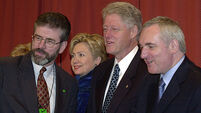State papers: Mary Robinson and government in conflict over visit to observe famine in Somalia

President Mary Robinson on her visit to Somalia.
President Mary Robinson’s much-praised visit to Somalia in 1992 to highlight famine in the Horn of Africa was greeted with less enthusiasm by senior officials in Dublin, according to newly-released State papers.
The confidential files show leading civil servants were concerned about the high-profile role being taken by Ms Robinson, even though the trip had been commended on the international stage with even the prospect being raised that it could earn the Irish president the Nobel peace prize.













